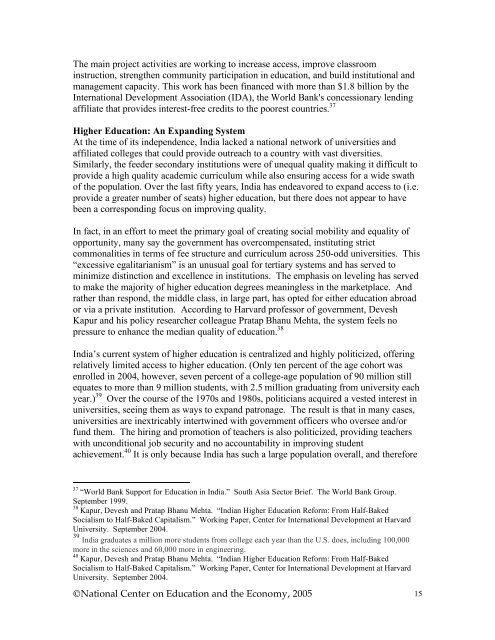India Education Report (2005) - NCEE
India Education Report (2005) - NCEE
India Education Report (2005) - NCEE
You also want an ePaper? Increase the reach of your titles
YUMPU automatically turns print PDFs into web optimized ePapers that Google loves.
The main project activities are working to increase access, improve classroom<br />
instruction, strengthen community participation in education, and build institutional and<br />
management capacity. This work has been financed with more than $1.8 billion by the<br />
International Development Association (IDA), the World Bank's concessionary lending<br />
affiliate that provides interest-free credits to the poorest countries. 37<br />
Higher <strong>Education</strong>: An Expanding System<br />
At the time of its independence, <strong>India</strong> lacked a national network of universities and<br />
affiliated colleges that could provide outreach to a country with vast diversities.<br />
Similarly, the feeder secondary institutions were of unequal quality making it difficult to<br />
provide a high quality academic curriculum while also ensuring access for a wide swath<br />
of the population. Over the last fifty years, <strong>India</strong> has endeavored to expand access to (i.e.<br />
provide a greater number of seats) higher education, but there does not appear to have<br />
been a corresponding focus on improving quality.<br />
In fact, in an effort to meet the primary goal of creating social mobility and equality of<br />
opportunity, many say the government has overcompensated, instituting strict<br />
commonalities in terms of fee structure and curriculum across 250-odd universities. This<br />
“excessive egalitarianism” is an unusual goal for tertiary systems and has served to<br />
minimize distinction and excellence in institutions. The emphasis on leveling has served<br />
to make the majority of higher education degrees meaningless in the marketplace. And<br />
rather than respond, the middle class, in large part, has opted for either education abroad<br />
or via a private institution. According to Harvard professor of government, Devesh<br />
Kapur and his policy researcher colleague Pratap Bhanu Mehta, the system feels no<br />
pressure to enhance the median quality of education. 38<br />
<strong>India</strong>’s current system of higher education is centralized and highly politicized, offering<br />
relatively limited access to higher education. (Only ten percent of the age cohort was<br />
enrolled in 2004, however, seven percent of a college-age population of 90 million still<br />
equates to more than 9 million students, with 2.5 million graduating from university each<br />
year.) 39 Over the course of the 1970s and 1980s, politicians acquired a vested interest in<br />
universities, seeing them as ways to expand patronage. The result is that in many cases,<br />
universities are inextricably intertwined with government officers who oversee and/or<br />
fund them. The hiring and promotion of teachers is also politicized, providing teachers<br />
with unconditional job security and no accountability in improving student<br />
achievement. 40 It is only because <strong>India</strong> has such a large population overall, and therefore<br />
37 “World Bank Support for <strong>Education</strong> in <strong>India</strong>.” South Asia Sector Brief. The World Bank Group.<br />
September 1999.<br />
38 Kapur, Devesh and Pratap Bhanu Mehta. “<strong>India</strong>n Higher <strong>Education</strong> Reform: From Half-Baked<br />
Socialism to Half-Baked Capitalism.” Working Paper, Center for International Development at Harvard<br />
University. September 2004.<br />
39 <strong>India</strong> graduates a million more students from college each year than the U.S. does, including 100,000<br />
more in the sciences and 60,000 more in engineering.<br />
40 Kapur, Devesh and Pratap Bhanu Mehta. “<strong>India</strong>n Higher <strong>Education</strong> Reform: From Half-Baked<br />
Socialism to Half-Baked Capitalism.” Working Paper, Center for International Development at Harvard<br />
University. September 2004.<br />
©National Center on <strong>Education</strong> and the Economy, <strong>2005</strong> 15


